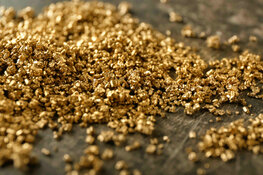Gold, Stocks and the Euro All Gain
Source: Ben Traynor, BullionVault (2/1/12)
"Based on month-end PM London Fix prices, January saw gold's biggest calendar month gain in dollar terms since September 1999."
The U.S. dollar cost of buying gold climbed to $1,750 an ounce Wednesday morning London time, gold's highest level since early December, while commodity prices also ticked higher and stock markets surged following the release of better-than-expected manufacturing data from several major economies.
Prices for buying silver rallied to $34.01/oz, though they remained below yesterday's high.
U.S. Treasury bond prices fell meantime, while the euro rallied 1.3% against the dollar.
"Buyers have returned to the euro, which is helping the situation in gold," says Ole Hansen, senior manager at Saxo Bank.
"[Gold] had a bit of lackluster profit-taking yesterday but didn't break anything important on the downside, which helped confirm that being long is back in vogue."
"I think that going forward, gold is still going to be looking at the U.S. and the Eurozone for direction," reckons Phillip Futures analyst Ong Yi Ling in Singapore.
The wholesale market price of buying gold in euros meantime rose to its highest level since September, hitting €42,864 per kilo (€1,333 per ounce) before dropping ahead of U.S. open.
Based on month-end PM London Fix prices, January saw gold's biggest calendar month gain in dollar terms since September 1999. The dollars-per-ounce price of buying gold was fixed at $1,744 yesterday, 13.9% up on the last PM Fix of 2011.
January also marked gold's best start to a year since 1980, Amanda Cooper at Reuters reports.
Stock markets meantime recorded their best January since 1994, according to Bloomberg, which cites a 5.8% rise for the MSCI All-Country World Index if dividends are included.
"Three things have been behind the recovery in risk assets," says Mike Ryan, chief investment strategist at UBS Wealth Management Americas in New York.
"Progress on a fiscal compact in Europe, better-than- expected economic data and more accommodative central-bank policies."
Stock markets gained strongly Wednesday morning, too—with the FTSE 100 in London up 1.4% and Germany's DAX up 2.4% by lunchtime—following news of worldwide manufacturing growth.
China's manufacturing sector grew in January, according to the official purchasing managers index release, which rose to 50.5 from 50.3 last month (a figure above 50 indicates expansion).
"Today's data further confirmed a soft-landing story for China," reckons Ken Peng, economist at BNP Paribas in Beijing.
"However, consumer demand may weaken after holiday effects disappear."
"New export orders declined," points out Wei Yao, China economist at Societe Generale.
"Together with a depressed level of backlog orders. . .the boost in total orders looks temporary, and suggests that manufacturers are not very optimistic about the near-term outlook. Given today's report, we think year on year export and import growth will prove to be barely positive in January."
China's PMI figure "was expansionary, but no so expansionary that we anticipate [monetary] tightening," says one gold dealer here in London.
"There will be a power transition in Beijing this year," adds a dealer in Hong Kong.
"I expect maintaining stability at all cost is what this government is going to do."
Britain's manufacturing sector also expanded in January, with the PMI coming in at 52.1, having been below 50 the previous month. Similarly, German manufacturing resumed growth last month, according to its January PMI, which was reported today as 51.0.
Eurozone manufacturing as a whole, however, continued to shrink, albeit at a slower rate, with the PMI rising from 46.9 in December to 48.8 last month.
Similar manufacturing data for the U.S. are released later on Wednesday. The latest ADP Employment Report meantime shows the U.S. added 170,000 private sector jobs in January, down from around 300,000 the previous month. The official nonfarm payrolls data are due to be released by the U.S. Bureau of Labor Statistics on Friday.
Greece's private sector creditors may be offered a "sweetener" in the form of a bond whose coupon is tied to future economic growth, Bloomberg reports. Negotiations, which Greek finance minister Evangelos Venizelos said yesterday are "one step" from success, stalled last week after parties could not agree on the size of the coupon on new bonds for which existing ones would be swapped.
The government in India, the world's largest source of demand for buying gold, announced Wednesday it is raising the base import price of gold by 5.7% to $556 per 10 grams. Silver's base import price will rise 12% to $1,067 per kilo. The base import price is the price used to calculate the import duty.
The move follows last month's switch from discrete to ad valorem taxation, a move which also saw the effective duty on gold almost doubled.
The higher import duties have had a "definite impact" on demand for buying gold in India, according to Harshad Ajmera, proprietor of JJ Gold House in Kolkata.
Ben Traynor
BullionVault
Editor of Gold News, the analysis and investment research site from world-leading gold ownership service BullionVault, Ben Traynor was formerly editor of the Fleet Street Letter, the UK's longest-running investment letter. A Cambridge economics graduate, he is a professional writer and editor with a specialist interest in monetary economics.
(c) BullionVault 2012
Please Note: This article is to inform your thinking, not lead it. Only you can decide the best place for your money, and any decision you make will put your money at risk. Information or data included here may have already been overtaken by events—and must be verified elsewhere—should you choose to act on it.
Prices for buying silver rallied to $34.01/oz, though they remained below yesterday's high.
U.S. Treasury bond prices fell meantime, while the euro rallied 1.3% against the dollar.
"Buyers have returned to the euro, which is helping the situation in gold," says Ole Hansen, senior manager at Saxo Bank.
"[Gold] had a bit of lackluster profit-taking yesterday but didn't break anything important on the downside, which helped confirm that being long is back in vogue."
"I think that going forward, gold is still going to be looking at the U.S. and the Eurozone for direction," reckons Phillip Futures analyst Ong Yi Ling in Singapore.
The wholesale market price of buying gold in euros meantime rose to its highest level since September, hitting €42,864 per kilo (€1,333 per ounce) before dropping ahead of U.S. open.
Based on month-end PM London Fix prices, January saw gold's biggest calendar month gain in dollar terms since September 1999. The dollars-per-ounce price of buying gold was fixed at $1,744 yesterday, 13.9% up on the last PM Fix of 2011.
January also marked gold's best start to a year since 1980, Amanda Cooper at Reuters reports.
Stock markets meantime recorded their best January since 1994, according to Bloomberg, which cites a 5.8% rise for the MSCI All-Country World Index if dividends are included.
"Three things have been behind the recovery in risk assets," says Mike Ryan, chief investment strategist at UBS Wealth Management Americas in New York.
"Progress on a fiscal compact in Europe, better-than- expected economic data and more accommodative central-bank policies."
Stock markets gained strongly Wednesday morning, too—with the FTSE 100 in London up 1.4% and Germany's DAX up 2.4% by lunchtime—following news of worldwide manufacturing growth.
China's manufacturing sector grew in January, according to the official purchasing managers index release, which rose to 50.5 from 50.3 last month (a figure above 50 indicates expansion).
"Today's data further confirmed a soft-landing story for China," reckons Ken Peng, economist at BNP Paribas in Beijing.
"However, consumer demand may weaken after holiday effects disappear."
"New export orders declined," points out Wei Yao, China economist at Societe Generale.
"Together with a depressed level of backlog orders. . .the boost in total orders looks temporary, and suggests that manufacturers are not very optimistic about the near-term outlook. Given today's report, we think year on year export and import growth will prove to be barely positive in January."
China's PMI figure "was expansionary, but no so expansionary that we anticipate [monetary] tightening," says one gold dealer here in London.
"There will be a power transition in Beijing this year," adds a dealer in Hong Kong.
"I expect maintaining stability at all cost is what this government is going to do."
Britain's manufacturing sector also expanded in January, with the PMI coming in at 52.1, having been below 50 the previous month. Similarly, German manufacturing resumed growth last month, according to its January PMI, which was reported today as 51.0.
Eurozone manufacturing as a whole, however, continued to shrink, albeit at a slower rate, with the PMI rising from 46.9 in December to 48.8 last month.
Similar manufacturing data for the U.S. are released later on Wednesday. The latest ADP Employment Report meantime shows the U.S. added 170,000 private sector jobs in January, down from around 300,000 the previous month. The official nonfarm payrolls data are due to be released by the U.S. Bureau of Labor Statistics on Friday.
Greece's private sector creditors may be offered a "sweetener" in the form of a bond whose coupon is tied to future economic growth, Bloomberg reports. Negotiations, which Greek finance minister Evangelos Venizelos said yesterday are "one step" from success, stalled last week after parties could not agree on the size of the coupon on new bonds for which existing ones would be swapped.
The government in India, the world's largest source of demand for buying gold, announced Wednesday it is raising the base import price of gold by 5.7% to $556 per 10 grams. Silver's base import price will rise 12% to $1,067 per kilo. The base import price is the price used to calculate the import duty.
The move follows last month's switch from discrete to ad valorem taxation, a move which also saw the effective duty on gold almost doubled.
The higher import duties have had a "definite impact" on demand for buying gold in India, according to Harshad Ajmera, proprietor of JJ Gold House in Kolkata.
Ben Traynor
BullionVault
Editor of Gold News, the analysis and investment research site from world-leading gold ownership service BullionVault, Ben Traynor was formerly editor of the Fleet Street Letter, the UK's longest-running investment letter. A Cambridge economics graduate, he is a professional writer and editor with a specialist interest in monetary economics.
(c) BullionVault 2012
Please Note: This article is to inform your thinking, not lead it. Only you can decide the best place for your money, and any decision you make will put your money at risk. Information or data included here may have already been overtaken by events—and must be verified elsewhere—should you choose to act on it.



































